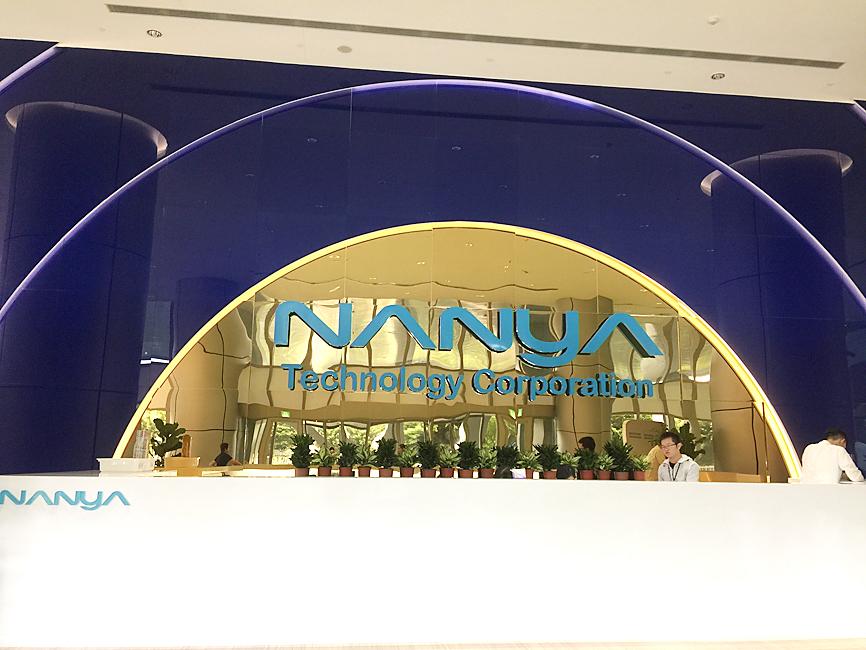DRAM chipmaker Nanya Technology Corp (南亞科技) expects selling prices this quarter to edge downward by a single-digit percentage or remain flat from last quarter as Russia’s invasion of Ukraine and China’s COVID-19 lockdowns add to market uncertainty and dim business prospects.
As Russia’s war against Ukraine prompted raw material costs and shipping fees to surge, and concern has grown over rising inflation, placing a dent in consumer demand for electronics such as TVs, Nanya Technology president Lee Pei-ing (李培瑛) told an online media briefing yesterday.
“On the demand side, smartphone demand did slow a bit. Consumer notebook computers were also affected. High inflation and weaker consumer spending were likely the reasons. Seasonal factors were also behind the slowdown,” Lee said.

Photo: Grace Hung, Taipei Times
Demand for DRAM chips used in cloud-based servers, commercial laptops and gaming computers remains solid, he said.
“From prices in April, it looks like any price decline in the second quarter will be smaller, or even flat, compared with the first quarter,” Lee said. “But, there is a lot of uncertainty. We need to look at the market situation month by month for the rest of the quarter.”
Overall, DRAM prices this quarter are likely to dip by a low single-digit percentage on a quarterly basis, or remain unchanged, after a 5 percent decline in DRAM prices in the first quarter, Lee said.
Before the war, Nanya Technology expected a robust rebound in prices and estimated that DRAM prices would begin to climb in the second quarter.
However, the firm’s shipments in this quarter are likely to resemble the first quarter’s, Lee said yesterday.
The war in Ukraine has not had a significant effect on the company’s chip shipments due to its small exposure to Russia and Ukraine, Nanya Technology said, adding that it suspended shipments to Russia after it invaded its neighbor on Feb. 24.
The lockdown in Shanghai is bringing challenges to the whole supply chain, as customers try to find solutions to transport restrictions in China, Lee said, adding that the lockdown has made it difficult to transport goods in and out of the city.
Lee added that some customers had said that the curbs could remain in place until Monday next week in some districts of Shanghai.
Some customers have destined deliveries to Chongqing, a manufacturing hub for notebook computer makers, or even to Thailand, he said.
Nanya Technology yesterday posted NT$6.55 billion (US$225.47 million) in net profit for last quarter, up 1.5 percent quarter-on-quarter from NT$6.45 billion. That represented annual growth of 142 percent from NT$2.7 billion.
Earnings per share last quarter rose to NT$2.11 from NT$2.08 a quarter earlier and NT$0.88 a year earlier, while gross margin fell for a third straight quarter to 31.4 percent from 37.5 percent in the first quarter.
Construction of a 12-inch fab is to be postponed by two to three quarters due to red tape, Nanya Technology said, adding that the fab would likely begin mass production in 2025, not 2024.
The firm has this year budgeted NT$28.4 billion in capital spending to fund construction and expand capacity, and manufacture its first 10-nanometer class of chips — “10-nanometer class” includes using 10-nanometer to 20-nanometer advance process technologies.

UNCERTAINTY: Innolux activated a stringent supply chain management mechanism, as it did during the COVID-19 pandemic, to ensure optimal inventory levels for customers Flat-panel display makers AUO Corp (友達) and Innolux Corp (群創) yesterday said that about 12 to 20 percent of their display business is at risk of potential US tariffs and that they would relocate production or shipment destinations to mitigate the levies’ effects. US tariffs would have a direct impact of US$200 million on AUO’s revenue, company chairman Paul Peng (彭雙浪) told reporters on the sidelines of the Touch Taiwan trade show in Taipei yesterday. That would make up about 12 percent of the company’s overall revenue. To cope with the tariff uncertainty, AUO plans to allocate its production to manufacturing facilities in

Taiwan will prioritize the development of silicon photonics by taking advantage of its strength in the semiconductor industry to build another shield to protect the local economy, National Development Council (NDC) Minister Paul Liu (劉鏡清) said yesterday. Speaking at a meeting of the legislature’s Economics Committee, Liu said Taiwan already has the artificial intelligence (AI) industry as a shield, after the semiconductor industry, to safeguard the country, and is looking at new unique fields to build more economic shields. While Taiwan will further strengthen its existing shields, over the longer term, the country is determined to focus on such potential segments as

Chizuko Kimura has become the first female sushi chef in the world to win a Michelin star, fulfilling a promise she made to her dying husband to continue his legacy. The 54-year-old Japanese chef regained the Michelin star her late husband, Shunei Kimura, won three years ago for their Sushi Shunei restaurant in Paris. For Shunei Kimura, the star was a dream come true. However, the joy was short-lived. He died from cancer just three months later in June 2022. He was 65. The following year, the restaurant in the heart of Montmartre lost its star rating. Chizuko Kimura insisted that the new star is still down

While China’s leaders use their economic and political might to fight US President Donald Trump’s trade war “to the end,” its army of social media soldiers are embarking on a more humorous campaign online. Trump’s tariff blitz has seen Washington and Beijing impose eye-watering duties on imports from the other, fanning a standoff between the economic superpowers that has sparked global recession fears and sent markets into a tailspin. Trump says his policy is a response to years of being “ripped off” by other countries and aims to bring manufacturing to the US, forcing companies to employ US workers. However, China’s online warriors